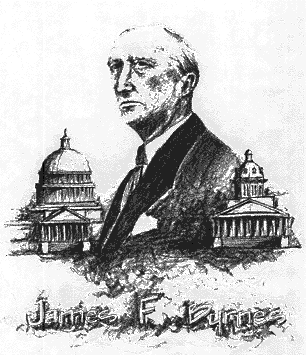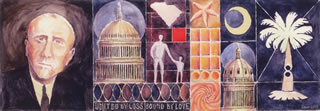James F. Byrnes, 1879-1979
Portrait of a Statesman
A Centennial Retrospective
Following is the text of the program for the exhibit James F.
Byrnes, 1879-1979, Portrait of a Statesman at the McKissick
Museums, The University of South Carolina, in 1979.

James F. Byrnes, 1879-1979
Portrait of a Statesman
A Centennial Retrospective
James F. Byrnes was the greatest statesman to come from South Carolina
in the twentieth century. In his lifetime he was a lawyer, editor of The
Aiken Journal and Review, court stenographer, circuit solicitor, Congressman,
Senator, Justice of the US Supreme Court, "Assistant President" of the United States, Secretary
of State of the United States, Governor of
South Carolina, Representative to the United Nations, author, benefactor
and statesman. He was a public servant for forty-five of his ninety-two
years. Byrnes was fond of quoting Tolstoy that,
"The sole meaning of life is to serve humanity." In the broad
perspective of time, he was influential in making his state, country
and the world a better place in which to live.
Serving humanity was a moral and ethical obligation to him. In 1948
he added to his goal of service the simple role of benefactor by establishing The
James F. Byrnes Foundation, which continues today. Byrnes himself
had been orphaned shortly before his birth by the death of his father.
He had to leave school at fourteen to aid his widowed mother and was
a self-taught lawyer and court stenographer -- learning shorthand,
which he was to utilize all his life. Through this Foundation over
five hundred men and women [Ed. Note: now more than 880] who
were orphaned by the death of either or both parents, have received
a total of over one-half million dollars [Ed. Note: now more than
$3,500,000] to further their education. Byrnes often referred
to this program -- one in which all of his worldly goods were incorporated
-- as "...the most rewarding thing I ever did in my life."
No one had a greater sense of public service than did Mr. Byrnes.
He had as little concern about money and material things as any man
in public life. He was devoted to public service, and the ambition
of his life was to render the best. No offer or temptation for monied
salary or compensation was sufficient to lure him from that ambition.
As a public servant he willingly left the Supreme
Court -- a position of high esteem with lifetime security -- to
head the Office of Economic Stabilization.
He heeded the call of a grieving nation in 1945 to come out of a brief
retirement and serve as Secretary of State.
Byrnes was a reconciler of men -- one who believed that the art of
legislating was the art of intelligent compromise. He practiced what
he preached throughout his life, remaining popular among both Democrats
and Republicans because of his ability to reconcile the differences
of independent men into a working agreement. Byrnes' role in the Senate between 1930 and 1941 as devoted public servant
and conciliator enabled a great deal of legislation to come into being
which might have otherwise been defeated. Because he believed in FDR
he was able to convince others from his region to join with him in
promoting the New Deal. He used that characteristic on the Supreme
Court and in the Executive Branch where
for five years he was one of the single most important brokers for
America on the domestic and foreign scene. As Director
of War Mobilization, a position which he held from 1943 to 1945,
he had the power to originate policies and layout programs that would
coordinate the work of all the war agencies and Federal departments
in any way connected with the production, procurement, transportation
and distribution of both civilian and military supplies.
The South that produced Byrnes lacked industry, roads and educational
facilities, and moved slowly to correct these ills. It was small farm-
and factory-oriented with a strong emphasis on yesterday and little
emphasis on tomorrow. This man, a product of Southern rural America
who was conditioned by its values of individualism, became an international
figure, who met with Josef Stalin and Winston Churchill at Yalta and
Potsdam to forge the policies which dominated the world for the next
thirty years. A man essentially conservative, with a conservative South
Carolina distaste for change, he was instrumentally involved from 1932
to 1937 in some of the greatest changes this nation has ever witnessed.
Byrnes was influenced by the ideas and interests of men like Governor
Ben Tillman. His early Southern populist views made him an instrumental
figure in the creation of a special committee in the U.S. House of Representatives
dealing with the building of roads using Federal moneys. Strongly patriotic,
he was one of President Wilson's more ardent supporters when it became
necessary for the United States to join in World War I.
In the Senate he was very protective of the South's emerging textile
industry. He fought long and hard in their interest -- typifying Southern
patriotic attitudes -- and assisted Roosevelt's New Deal legislative
program, except when conscience moved him, as in the court-packing
bill of 1937. He also wished to outlaw sit-down strikes and he could
not see why the Federal Government should put a floor under wages and
a ceiling over hours.
Byrnes had spent thirty-one years in Federal politics when he ran
for Governor in 1950. But he remained at
heart a Southerner. He strongly opposed integration but poured more
money into Black schools ($66 million) than all previous governors
before him combined. He was shocked at the 1954 Supreme Court decision
that separate was not equal. To the end he was a product of early twentieth
century South Carolina in his politics and attitudes.
In the many positions he held throughout his life one factor remained
a constant -- "the art of intelligent compromise." Byrnes
was a unique individual in this respect. Throughout his career he was
called upon to mediate, conciliate and compromise opposing factions
into an agreeable solution. His House and Senate career epitomized
this attribute. Many a piece of legislation -- not necessarily with
his name imprinted on it -- was a product of this rare commodity in
the man.
When factionalism was tearing at the heart of the government during
World War II, FDR used Byrnes to troubleshoot for him. When Harry Truman
became President, suddenly, with little background in what was happening
on the foreign front, he sought out Byrnes, on whom he leaned for advice
in dealing with the newly emerging Soviet threat and with questions
concerning the reconstruction of Western Europe. At the various peace
conferences he attended as Secretary of State,
he needed to summon all the mediation and conciliation he had in him
to deal with the Russians. Patient and firm, and then just firm, were
his attributes toward the Soviets and their chief negotiator, Mr. Molotov.
It was hard to beat the Russians, but Mr. Byrnes did it at their own
game.
James F. Byrnes was a product as well as a practitioner of American
politics. He and the system complemented one another, as attested to
by his rise from a humble Irish Catholic background in Charleston to
a man of state, national and international influence. It is a tribute
to the American system that an individual with limited formal education
could, by determination, ambition and diligence, enter the highest
councils of the world.





